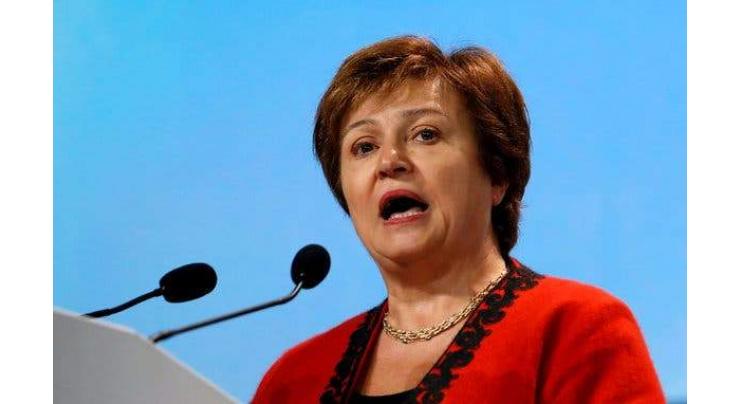
IMF Annual Meetings Chance For US, China To Move To 'Trade Peace' - Managing Director
Umer Jamshaid Published October 17, 2019 | 10:19 PM

The annual International Monetary Fund (INF) meetings held this week provide an opportunity for the United States and China to end the trade war, IMF Managing Director Kristalina Georgieva said on Thursday
"The IMF meetings this week in Washington is an opportunity for all parties to make progress in moving from a trade truth to a trade peace," Georgieva said during an opening news conference for the annual meetings.
On Friday, US President Donald Trump said Beijing and Washington had agreed on the first phase of a trade deal after reaching consensus on several key issues - Currency exchange, technology transfer, intellectual property, financial services and the purchase of up to $50 billion worth of US agricultural goods by China.
Georgieva said that she was encouraged by the announcement and urged the parties to continue until a final agreement is reached.
Other IMF senior staff, including First Deputy Managing Director David Lipton, echoed Georgieva's statements.
"The United States and China need to deescalate conflict and have dialogue," Lipton said. "Both countries have a lot to gain, but gains only come if there is real compromise."
The trade row between the world's two largest economies erupted in June 2018 when the United States imposed the first - of many - round of tariffs on Chinese exports, prompting Beijing to respond in kind. Since, the two countries have been engaged in a full-blown trade war, but have also started negotiations to resolve their trade-related differences.
On Tuesday, IMF Chief Economist Gita Gopinath said the US-China trade tensions will likely reduce global GDP growth by around 0.8 percent in 2020 if left unresolved.
Related Topics
Recent Stories

Selection committee dissolved over Pakistan women cricket team's poor performanc ..

Punjab CM Maryam Nawaz in police uniform at Chung police center

Currency Rate In Pakistan - Dollar, Euro, Pound, Riyal Rates On 25 April 2024

Today Gold Rate in Pakistan 25 April 2024

Mired in crisis, Boeing reports another loss

Session Awarding Ceremony 2024 held at Cadet College Muzaffarabad

Austrian ski great Hirscher to make comeback under Dutch flag

Pakistan, Japan agrees to convene 'Economic Policy Dialogue'

FM Dar conveys deepest sympathy on torrential rains devastation in UAE

Spain PM Sanchez says weighing resignation after wife's graft probe

Tennis: ATP/WTA Madrid Open results - 1st update

Long-lost Klimt portrait auctioned off for 30 mn euros
More Stories From World
-
Blades of Paris landmark Moulin Rouge windmill collapse
9 minutes ago -
Car giants vie for EV crown at Beijing's Auto China show
19 minutes ago -
Blades of Paris landmark Moulin Rouge windmill collapse
29 minutes ago -
Advanced 5G base station launched in Mt. Qomolangma
29 minutes ago -
China committed to supporting Zimbabwe's innovation-driven development
39 minutes ago -
Myanmar to hold 59th gems emporium next month
1 hour ago
-
Digital economy contributes 8.4 pct to Philippine economy in 2023
1 hour ago -
China committed to supporting Zimbabwe's innovation-driven development
1 hour ago -
Starfish control program improving health of Australia's Great Barrier Reef: report
1 hour ago -
Pakistan calls for addressing development changes at a key UN meeting
1 hour ago -
Advanced 5G base station launched in Mt. Qomolangma
1 hour ago -
Cambodia on right track to achieving malaria-free goal by 2025: PM
1 hour ago